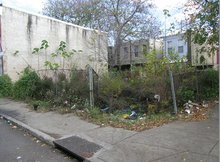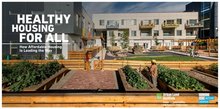Found 283 resources.
0
0
0
Democrats this week announced new legislation that would slash child poverty by paying low-income parents the kind of monthly allowance that is standard in other developed countries. But the lawmakers who introduced the bill, called the American Family Act, didn’t use the terms “child benefit” or “child allowance” at their Capitol Hill press conference Wednesday. Instead, they all called it a tax credit or a tax cut.
Topics: Child welfare, Dual-generation, Early childhood, Funding, Legislation & Policy, Low-income, Research
 Shared by Housing Is
on Mar 12, 2019
Shared by Housing Is
on Mar 12, 2019 0
0
0

A new study measured the mental health of Philadelphia residents before and after blighted lots had been converted into green spaces.
Topics: Community development, Health, Mental health, Place-based, Research
 Shared by Housing Is
on Mar 11, 2019
Shared by Housing Is
on Mar 11, 2019 0
0
0

Healthy Housing for All: How Affordable Housing is Leading the Way explores the affordable housing industry’s achievements in creating healthier housing environments and translates them into lessons for the broader housing marketplace. The innovations in healthy affordable housing present an opportunity to replicate healthy housing successes, as well as to respond to market demand across the residential development industry.
Topics: Health, Housing, Legislation & Policy, Research
 Shared by Housing Is
on Mar 11, 2019
Shared by Housing Is
on Mar 11, 2019 0
0
0

The number of kids enrolled in Medicaid and the Children’s Health Insurance Program (CHIP) — two government health plans for the poor — fell by nearly 600,000 in the first 11 months of 2018, a precipitous drop that has puzzled and alarmed many health policy analysts, while several states say it reflects the good news of an improving economy.
Topics: Affordable Care Act, Child welfare, Early childhood, Health, Legislation & Policy, Low-income, Medicaid / Medicare, Research, Youth
 Shared by Housing Is
on Mar 8, 2019
Shared by Housing Is
on Mar 8, 2019 0
0
0
One out of every 10 young people between the ages of 16 and 24 is neither working nor in school. These “disconnected” young people face an uphill battle finding work and are at risk of economic hardship well into adulthood. Although there are many programs that aim to reconnect young people to education and employment, findings from evaluations of these programs have been mixed. The evidence base has grown substantially in the past several months, though, as studies of three programs — YouthBuild, Year Up, and New York City’s Young Adult Internship Program (YAIP) — have released new findings...
Topics: Asset building, Low-income, Mobility, Research, Workforce development, Youth
 Shared by Housing Is
on Mar 8, 2019
Shared by Housing Is
on Mar 8, 2019 0
0
0
Improved access to health insurance contributed to reducing worry and stress associated with paying rent/mortgage or purchasing meals among low-income people. Expanding health insurance access may have contributed to increasing the disposable income of low income groups.
Topics: Affordable Care Act, Health, Housing, Low-income, Medicaid / Medicare, Mental health, Research, Stability
0
0
0
The California Homeless Youth Project (HYP) is a research and policy initiative that highlights the issues and challenges faced by unaccompanied young people who are homeless or lack stable housing. This website provides state and local policymakers and others with information and policy resources specific to unaccompanied homeless youth, with a focus on young people in California.
Topics: Education, Homelessness, Housing, Legislation & Policy, Research, West Coast
 Shared by Housing Is
on Mar 5, 2019
Shared by Housing Is
on Mar 5, 2019 0
0
0
Federal tax credits, like the EITC and refundable CTC, provide critical supports for millions of working women, children, and families every year. They supplement low wages and can help soften the financial impact of fluctuating incomes or job losses. These credits are especially important for communities of color and women.
Topics: Child welfare, Legislation & Policy, Low-income, Research
0
0
0
In light of the many costs generated by child poverty for the United States, a new report from the National Academies of Sciences, Engineering, and Medicine provides evidence-based policy and program packages that could cut the child poverty rate by as much as 50 percent while at the same time increasing employment and earnings among adults living in low-income families.
Topics: Child welfare, Legislation & Policy, Low-income, Research
0
0
0
The strengths and abilities children develop from infancy through adolescence are crucial for their physical, emotional, and cognitive growth, which in turn help them to achieve success in school and to become responsible, economically self-sufficient, and healthy adults. Capable, responsible, and healthy adults are clearly the foundation of a well-functioning and prosperous society, yet America’s future is not as secure as it could be because millions of American children live in families with incomes below the poverty line. A wealth of evidence suggests that a lack of adequate economic...
Topics: Child welfare, Dual-generation, Legislation & Policy, Low-income, Research
 Shared by Housing Is
on Mar 1, 2019
Shared by Housing Is
on Mar 1, 2019 0
0
0
The monthly benefits provided by SNAP enhance the food purchasing power of eligible low-income individuals and families. However, as described by many studies, including one by the Institute of Medicine, the greatest shortcoming of SNAP is that benefits for most households are not enough to get through the entire month without hunger or being forced to sacrifice nutrition quality. This limitation persists even in the face of overwhelming evidence on the gains from more adequate monthly SNAP benefits.This paper analyzes why SNAP benefits are inadequate, reviews the body of research showing...
Topics: Food insecurity, Legislation & Policy, Low-income, Nutrition, Research
 Shared by Housing Is
on Mar 1, 2019
Shared by Housing Is
on Mar 1, 2019 0
0
0
This annual report analyzes participation in the School Breakfast Program among low-income children nationally and in each state and the District of Columbia for the 2017–2018 school year. The report features best practices for increasing participation in the program, including breakfast after the bell models and community eligibility.
Topics: Child welfare, Education, Food insecurity, Metrics, Nutrition, Research
 Shared by Housing Is
on Mar 1, 2019
Shared by Housing Is
on Mar 1, 2019 0
0
0
In this study, researchers conduct a literature review across public health, environmental health, medical, sociology, and urban planning journals to synthesize the research on the mental health effects of rat infestations on residents living in urban neighborhoods.
Topics: Health, Housing, Low-income, Mental health, Research, Safety
 Shared by Housing Is
on Feb 28, 2019
Shared by Housing Is
on Feb 28, 2019 0
0
0
Over the past two decades, criminal justice reform has focused on evidence-based interventions to prevent arrests and incarceration and to facilitate community reintegration. These initiatives represent a movement toward a less punitive, more holistic approach to public safety, targeting critical social factors that lead to and perpetuate criminal justice involvement. Because housing problems are often a key underlying factor for people’s involvement with the criminal justice system, there are ways housing interventions can help lessen criminal justice involvement. Decriminalizing...
Topics: Criminal justice, Homelessness, Housing, Legislation & Policy, Low-income, Research, Stability
0
0
0
Welcome to the Food Research & Action Center’s winter issue of ResearchWire. This quarterly newsletter focuses on the latest research, reports, and resources from government agencies, academic researchers, think tanks, and elsewhere at the intersection of food insecurity, poverty, the federal nutrition programs, and health.
Topics: Child welfare, Food insecurity, Funding, Health, Legislation & Policy, Low-income, Nutrition, Research, Youth
0
0
0

Homelessness among students enrolled in schools from kindergarten through 12th grade has increased 70 percent over the last decade.
Topics: Child welfare, Education, Homelessness, Housing, Research, Youth
 Shared by Housing Is
on Feb 25, 2019
Shared by Housing Is
on Feb 25, 2019 0
0
0

For many years, the vulnerabilities of children experiencing homelessness have been glossed over on the assumption that their innate resilience would overcome the impact of homelessness. As someone who worked in the field, I would often hear, “Oh, they’ll never remember.” Today we know better. We know more about how the brain develops and about how trauma impacts brain development. There is a growing recognition among providers that these early years are critical for establishing a foundation for emotional, mental, and physical wellbeing, and that we don’t get a second chance at early...
Topics: Early childhood, Education, Homelessness, Housing, Low-income, Research, Safety, Stability
 Shared by Housing Is
on Feb 21, 2019
Shared by Housing Is
on Feb 21, 2019 0
0
0
As the US Department of Housing and Urban Development (HUD) prioritizes programs to help households receiving rental assistance achieve economic self-sufficiency, researchers, policymakers, and advocates debate the utility of work requirements as an effective pathway toward economic self-sufficiency and the risks of offering rental assistance on a conditional basis. This study contributes additional evidence suggesting that work requirements, when implemented gradually and in context with hardship exemptions and local supports, can boost annual household income, earnings, and the adult-...
Topics: Asset building, Housing, Legislation & Policy, Low-income, Research, Workforce development
 Shared by Housing Is
on Feb 21, 2019
Shared by Housing Is
on Feb 21, 2019 0
0
0
Recently, several of the BUILD communities approached us with a seemingly straightforward question about how many housing inspectors other cities have to enforce their rental codes and protect residents from unsafe housing. They intended to use this information to better understand the role housing inspectors play within different communities, since they are often a major stakeholder in identifying and addressing building related issues that directly impact the health of residents (e.g., chronic asthma).
Topics: Asthma, Health, Housing, Research, Safety
0
0
0
U.S. House Committee on Financial Services, Full Committee
Topics: Funding, Homelessness, Housing, Legislation & Policy, Research, Stability
0
0
0
In the summer of 2018, Ascend gathered more than two dozen state and national policy experts and other leaders in the fields of health and early learning at its Aspen Meadows Campus in Aspen, Colorado, to discuss the growing opportunity to leverage the 2Gen approach at the state level and determine how best to take promising new innovations to scale. This report offers a snapshot of specific things federal, state, and local leaders can keep doing, start doing, or stop doing to remove barriers and accelerate success.
Topics: Dual-generation, Early childhood, Family engagement, Legislation & Policy, Research
 Shared by Housing Is
on Feb 15, 2019
Shared by Housing Is
on Feb 15, 2019 0
0
0
This report marks the thirteenth school year for which the U.S. Department of Education (ED) has collected annual performance data from all states for the Education for Homeless Children and Youth (EHCY) program. The EDFacts Submission System allows for the collection of unduplicated data on students who experienced homelessness and were reported as enrolled in public schools, even if they attend more than one local educational agency (LEA) during the school year. This report draws from that data to provide the only publicly available compilation of unduplicated data for the EHCY program.
Topics: Education, Homelessness, Housing, Research, Youth
0
0
0
This report identifies services that help low-income individuals and households achieve upward economic mobility and explores how affordable housing providers offer them. We begin by presenting key economic mobility concepts and definitions. We then discuss the research evidence on interventions across sectors and disciplines that help individuals and households to achieve upward economic mobility. In the third section of this report, we present our findings from interviews with leading organizations and initiatives in the field. Finally, we discuss challenges for affordable housing providers...
Topics: Asset building, Housing, Legislation & Policy, Low-income, Research, Workforce development
 Shared by Housing Is
on Feb 14, 2019
Shared by Housing Is
on Feb 14, 2019 0
0
0
Zoning, a topic usually buried in the real estate sections of local newspapers or debated at community planning meetings, has recently taken the national stage. Zoning figures prominently in the debates over the value that Amazon HQ2 will deliver to Arlington, Virginia, and New York City, while coverage of the affordable housing crisis in states like California blames local zoning restrictions. Cities like Minneapolis, which is radically rewriting its zoning codes, are being hailed as national models.
Topics: Community development, Housing, Legislation & Policy, Research
 Shared by Housing Is
on Feb 14, 2019
Shared by Housing Is
on Feb 14, 2019 0
0
0
Local officials, impact investors, and philanthropy have important roles to play in helping communities access Opportunity Zone financing that benefits current residents, especially those with low or moderate incomes. Using Chicago and Cook County as a case study, we identify steps these actors can take to attract helpful, and limit harmful, investments. We find that the Opportunity Zones selected in Chicago and Cook County broadly fulfilled the incentive’s spirit, targeting areas that were more economically distressed. Going forward, it will be necessary to leverage available policy and...
Topics: Community development, Funding, Housing, Legislation & Policy, Midwest, Place-based, Research
 Shared by Housing Is
on Feb 14, 2019
Shared by Housing Is
on Feb 14, 2019 